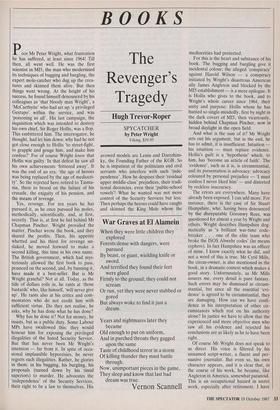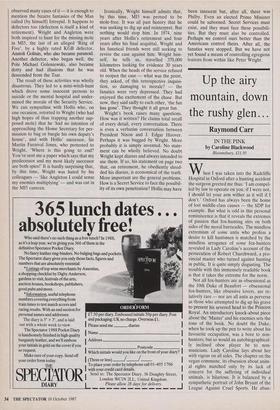BOOKS
The Revenger's Tragedy
Hugh Trevor-Roper
SPYCATCHER by Peter Wright Viking, $19.95 Poor Mr Peter Wright, what frustration he has suffered, at least since 1964! Till then, all went well. He was the first scientist in MI5, the man who modernised its techniques of bugging and burgling, the expert mole-catcher who dug up the crea- tures and skinned them alive. But then things went .wrong. At the height of his success, he found himself denounced by his colleagues as `that bloody man Wright', a `McCarthyite' who had set up `a privileged Gestapo' within the service, and was `poisoning us all'. His last campaign, the inquisition which was intended to destroy his own chief, Sir Roger Hollis, was a flop. This embittered him. The interrogator, he thought, had let him down: why had he not got close enough to Hollis 'to street-fight, to grapple and gouge him, and make him confess?' For of course Wright knew that Hollis was guilty. In that defeat he saw all his own achievements 'frittered away'. It was the end of an era: `the age of heroes was being replaced by the age of mediocri- ty'. So the rejected hero retired to Tasma- nia, there to brood on the failure of his crusade, the exiguity of his pension, and the means of revenge.
Yes, revenge. For ten years he has pursued it, as he once pursued his moles, methodically, scientifically, and, at first, secretly. That is, at first he hid behind Mr Chapman Pincher. Wright provided the matter, Pincher wrote the book, and they shared the profits. Then, his appetite whetted and his thirst for revenge un- slaked, he moved forward to make a second killing, this time in his own name. The British government, which had mys- teriously allowed the first book to pass, pounced on the second, and, by banning it, have made it a best-seller. But is Mr Wright grateful? Not at all. Today, as the tide of dollars rolls in, he rants at 'those bastards' who, like himself, `will never give up'. He rants also at his critics and com- mentators who do not credit him with sufficient virtue. Do they not realise, he asks, why he has done what he has done?
Why has he done it? Not for money, he insists, but as a public duty. Some Labour MPs have swallowed this: they would honour him for exposing the privileged illegalities of the hated Security Service. But that has never been Mr Wright's intention — far from it. In spite of occa- sional implausible hypocrisies, he never regrets such illegalities. Rather, he glories in them: in his bugging, his burgling, his proposals (turned down by his timid superiors) to murder. He advocates the 'independence' of the Security Services, their right to be a law to themselves. His avowed models are Lenin and Dzerzhins- ky, the Founding Father of the KGB. So he is impatient of the politicians and civil servants who interfere with such inde- pendence'. How he despises their 'residual upper middle-class' prejudices, their tradi- tional decencies, even their 'public-school vowels'! What he wanted was not more control of the Security Services but less. Then perhaps the heroes could have caught and skinned the King Mole whom the mediocrities had protected.
For this is the heart and substance of his book. The bugging and burgling give it incidental colour; the alleged 'conspiracy' against Harold Wilson — a conspiracy initiated by Wright's disastrous American ally James Angleton and blocked by the MI5 establishment — is a mere epilogue. It is Hollis who gives to the book, and to Wright's whole career since 1964, their unity and purpose: Hollis whom he has hunted so single-mindedly, first by night in the dark covert of MI5, then vicariously, hidden behind Chapman Pincher, now in broad daylight in the open field.
And what is the sum of it? Mr Wright sets out his argument, but in the end, he has to admit, it is insufficient. Intuition — his intuition — must replace evidence. Hollis's guilt is a 'hypothesis' which, to him, has `become an article of faith'. The 'evidence', such as it is, is circumstantial, and its presentation is advocacy: advocacy coloured by personal prejudice — `I must confess I never liked him' — and distorted by reckless inaccuracy.
The errors are everywhere. Many have already been exposed. I can add more. For instance, there is the case of Sir Stuart Hampshire, who, having been denounced by the disreputable Goronwy Rees, was questioned for almost a year by Wright and others. Wright describes Hampshire dog- matically as `a brilliant war-time code- breaker . . . one of the elite team who broke the ISOS Abwehr codes' (he means cyphers). In fact Hampshire was an officer of mine. I know exactly what he did, and not a word of this is true. Mr Cyril Mills, the circus-owner, is also mentioned in the book, in a dramatic context which makes a good story. Unfortunately, as Mr Mills assures me, every detail is pure fantasy. Such errors may be dismissed as circum- stantial, but since all the essential `evi- dence' is agreed to be circumstantial, they are damaging. How can we have confi- dence in his interpretation of other cir- cumstances which rest on his authority alone? In justice we have to allow that the experienced and more objective men who saw all his evidence and rejected his conclusions are as likely as he to have been right.
Of course Mr Wright does not speak to us direct. His voice is filtered by his unnamed script-writer, a fluent and per- suasive journalist. But even so, his own character appears, and it is clear that, in the course of his work, he became, like Angleton in America, somewhat paranoid. This is an occupational hazard in secret work, especially after retirement. I have observed many cases of it — it is enough to mention the bizarre fantasies of the Man called (by himself) Intrepid. It happens to defectors too (defection is itself a kind of retirement). Wright and Angleton were both inspired to hunt for the missing mole in MI5, the last of an alleged 'Ring of Five', by a highly rated KGB defector, Anatoli Golitsin, who also became paranoid. Another defector, who began well, the Pole Michael Goleniewski, also became dotty and had illusions that he was descended from the Tsar.
The result of these activities was wholly disastrous. They led to a mini-witch-hunt which drove some innocent persons to suicide or the mental hospital and under- mined the morale of the Security Service. We can sympathise with Hollis who, on one occasion, retorted to Wright (who had high hopes of thus trapping another sup- posed mole) that he 'had no intention of approaching the Home Secretary for per- mission to bug or burgle his own deputy's house', and with Hollis' successor, Sir Martin Furnival Jones, who protested to Wright, 'Where is this going to end? You've sent me a paper which says that my predecessor and my most likely successor are both spies!' It is hardly surprising that, by this time, Wright was hated by his colleagues — 'like Angleton I could sense my enemies multiplying' — and was cut in the MI5 canteen. Ironically, Wright himself admits that, by this time, MI5 was proved to be mole-free. It was all past history that he was seeking to dig up and reinterpret. But nothing would stop him. In 1974, nine years after Hollis's retirement and four years after his final acquittal, Wright and his fanatical friends were still seeking to revive the case against him. Wright him- self, he tells us, travelled 370,000 kilometres looking for evidence 30 years old. When the heads of the service refused to reopen the case — what was the point, they asked, of this retrospective inquisi- tion, so damaging to morale? — the fanatics were very depressed. They had enjoyed the excitement of the chase. But now, they said sadly to each other, 'the fun has gone'. They thought it all great fun.
Wright's book raises many questions. How was it written? He claims total recall of every detail, every conversation. There is even a verbatim conversation between President Nixon and J. Edgar Hoover. Perhaps it was bugged by Wright. More probably it is simply invented. No state- ment can be wholly believed. No doubt Wright kept diaries and always intended to use them. If so, his statement on page two that, on retirement, he obediently shred- ded his diaries, is economical of the truth. More important are the general problems. How is a Secret Service to face the possibil- ity of its own penetration? Hollis may have been innocent but, after all, there was Philby. Even an elected Prime Minister could be suborned. Secret Services must exist, and they must face these possibili- ties. But they must also be controlled. Perhaps we control ours better than the Americans control theirs. After all, the fanatics were stopped. But we have not yet found a means of controlling egregious traitors from within like Peter Wright.



























































 Previous page
Previous page